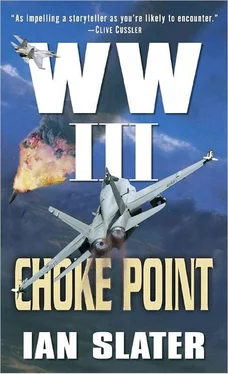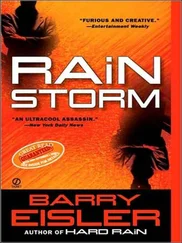Charles looked nonplused.
“What I’m saying, Charlie, is that soon as Chang told you about those terrorists talking about slag in—” Heinz glanced down at Charlie’s notes. “—Borberry’s Pub—”
“ Bar berry’s.”
“Yeah, well, Charlie, for a cultural attaché your handwriting sucks. Point is, old buddy, you should have called me on the hotline immediately. Like, right away! Xinjiang’s back-to-back with K-stan,” continued the military attaché, meaning Kazakhstan. “And Kazakhstan, Charlie, is oil . Three hundred million barrels a year. Most of it’s been piped to Russia, but that’s changing — fast. China’s Petroleum Corp. wants in on the tit. New deposits in the Caspian Sea puts Kazakhstan’s reserves to eighteen billion barrels. That, old buddy — now remember this, Charlie — equals three-quarters of the U.S. ’s total reserves. So we want into K-stan too — cut our dependence on Saudi Arabia et al. A lot of U.S. companies have already invested there. Problem is, among the 228 million people who inhabit the Stans, there are a lot of Muslim fanatics, and not just al Qaeda. Some of these terrorist crazies are stirring it up in K-stan. With one dirty bomb—”
“I’m not that dumb,” Riser told his colleague. “No one wants them to set the oil wells on fire.”
“Or the pipelines. You let one martyr get away with blowing himself up next to a pipeline and it starts a trend.”
“You can’t punish him,” Riser said wryly, “if he’s dead.”
“Correct. Which is why your info from Chang is red hot, because it’s telling us, Washington, D.C., that if there’s any sign of Li Kuan, who one of our SpecFor Direct Action teams was supposed to waste in Afghanistan but failed—” Heinz took a breath. “—if there’s any sign that Li Kuan and his henchmen are stirring the pot along the Chinese/K-stan border, Beijing’s going to kick ass and take names. And Uncle Sam had best stay out of it. Let the PLA get Li Kuan and his mob.”
So now Charlie Riser saw something he hadn’t before — that while it was nice of Chang to help him cut through the red tape and tell him what happened to Mandy, the general, and thus Beijing, had also seen it as an opportunity to use him as a conduit to the U.S.’s Beijing military attaché, thus informing Washington that Li Kuan, who’d given this SpecFor team the slip, was now headed for the K-stan — Chinese border and/or Taiwan to trigger chaos in China and the oilfields. But hopefully not chaos in America.
“So,” proffered Charles, “the Chinese don’t want the U.S. to interfere, should they have to wield a bit of stick.”
“Correct,” said the military attaché. “Oh, in case you’re tempted to get a big head about being the chosen messenger, don’t. The Chinese have been feeding us this line for a while through other channels. Not officially — too much danger of leaks to pain-in-the-ass human rights types who’d march on the U.N. if they knew. But if Chang’s right about Li Kuan moving to K-stan, we could see SMA there any minute.”
“SMA?” Riser asked, knowing it was the MA’s acronym for substantial military action, but wanting his colleague to explain it in English.
“Substantial—”
“War,” cut in Riser. “In Central Asia — or even Taiwan, if that’s where Beijing thinks the terrorists are about to strike. Beijing still sees Taiwan as a province of China.”
“Taiwan’s a long shot,” said the MA, climbing out of the embassy’s ICB bubble on the way to the code room. He was going to send this message himself.
Charlie could still see the spidery white frost in Mandy’s hair, covering her once lustrous sheen with a web of old age, years before her time. If anything good could possibly come of her death, maybe it would be Beijing’s messages to Washington, D.C., via his conversation with General Chang, to give Beijing a free hand against Li Kuan, to hunt him down and kill him.
On Petrel , the afterdeck, an island of light in the evening darkness, was illuminated by the arc light atop the A-frame. Albinski’s and Dixon’s umbilicals, which had earlier been groaning through the A-frame’s left block, now had to be stopped every few minutes to clear kelp from them as fast as possible. Then Albinski’s winch man called, “Thirty feet to surface.” A murmur of excitement passed through the dozen crewmen huddled around the dry lab, only Frank Hall’s work party of six men, including the bosun, allowed on the apron of steel directly beneath the A-frame’s block.
“Twenty feet to surface.”
“How ’bout Dixon?” asked one of the deck party.
“Another sixty-four,” answered the diver’s winch man, at once grateful for the cooling that each kelp-clearing stop afforded his winch’s motor, but worried too, like everyone else, whether the divers — if they were still alive — had enough air left in their Bail bottles to wait out the seemingly never-ending kelp clearance, the weed at times so thick about the umbilical that it wouldn’t pass through the block.
“In sight!” announced Albinski’s winch man. There was a loud cheer as bubbles erupted in an undulating circle of light that moved up and down the choppy surface like a sodden white sheet, the rain sweeping over it.
“Steady!” Frank cautioned the winch man. Sometimes in the excitement of a surfacing, the winch man miscalculated the rate of hoist during the final seconds of haul in which a diver emerged from the density of sea. His weight in air, if the winch man hadn’t geared down fast enough, could suddenly cause him to swing like a freed pendulum, smashing into the ship’s stern. “Steady! Steady!” said Frank.
“Holy shit!” It was one of the work party, literally taken aback when instead of the fiberglass helmet he’d expected to see, what was emerging from the sea was like something out of a horror movie: a huge, glistening mass of kelp. Some said afterward it was the size of a VW Beetle — an exaggeration, but it was big, the enormous fronds looking like the tentacles of the giant squids that other oceanographers had found off New Zealand. As yet, no sign of Albinski.
“Don’t just stand there!” bellowed the Petrel ’s bosun. “Get the pikes onto it.”
Frank Hall switched his mike channels. “Sonar?” he asked. “What else do you see besides the kelp?”
“Nothing sir. We’re too close to it. No definition — just a big blob of kelp obscuring the whole damn trace.”
Four of the work party had thrust out their pikes, the long-handled boat hooks grasping Albinski’s umbilical four to five feet below the A-frame’s starboard block. The men prevented a dangerous pendulum by using counterforce, pulling the umbilical in as Petrel ’s stern dipped in the swells, pushing against it as the stern rose atop the next swell. Two of the deck party were slicing at the kelp, torn between going so fast that they’d sever the umbilical or so cautiously that they’d lose the race against what they knew must be Albinski’s emergency air supply in his Bail bottle. And all the while, Dixon’s umbilical was moving at an agonizing snail’s pace through the A-frame’s portside block, its “smoke” stops and quivering tension meter needle testimony to the winch operator that he too was hauling in a massive load of kelp.
“You know,” said an off-duty crewman standing anxiously by the dry lab, “they use kelp to smooth out ice cream?” The outrageously inappropriate comment was presumably the only way he could deal with his own mounting anxiety.
Dixon’s winch man didn’t bother to respond. All his attention was on Albinski’s umbilical, which was swaying port to starboard and back like a hanged man’s rope, the umbilical’s thin communication wire missing, the black air hose, though, looking intact.
Читать дальше












